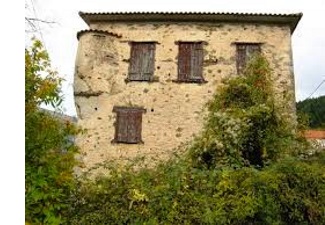| |
~ Solos ~
I
Manon Lescaut’s final aria,
a woman fatally banished,
exiled to New Orleans,
punished for her beauty
and resolve to love:
“Sola, perduta, abbandonata
in landa desolata!”
“Alone, lost, abandoned
in this desolate land!”
Haunting lines
inimitably sung by Callas
(herself abbandonata)
recall a different tale:
a forlorn family “pyrgos” (fortress-house)
in Solos, Achaea, Greece,
alone, neglected,
virtually forsaken.
A lost ancestral dwelling,
a forfeiture incurred
while paths were sought
in less remote terrain,
fortunes in Greek cities
and abroad.
Tucked into isolated mountains
studded with fragrant pines—
stark beauty and tranquil silence
vying for ascendancy—
the pyrgos stands alone,
visited on a blue moon
by progeny who harbor
wistful claims.
A large lumbering tortoise
salutes me on a recent pilgrimage.
I brake, wondering how he navigates
such treacherous ground,
paths spiraling 1200 meters
high above sea level,
his carapace a reptilian reproach
to human presumptions,
dreams of swift migration,
social climbing, property…
II
Mountains with a weighty history,
unrivaled drama,
clashing cultures staking claim
to every crag, peak and vale.
Civil war, Nazis, Italians,
Greek freedom fighters, brigands, pirates,
Ottomans, Venetians, Franks,
Crusaders, Byzantines, Slavs,
Romans, Macedonians, Persians,
Achaeans, Mycenaeans and Minoans:
a veritable A-list of invaders.
Culture here a chaotic mix,
grand arias—comedy, tragedy, farce—
stridently proclaiming fleeting greatness,
survival amidst invasion,
one group cunningly out-fortressing the other.
“Orror!
Intorno a me s’oscura il ciel.”
“Oh, horror!
Around me the sky darkens.”
“Oime, son sola!”
“Alas, I am alone!”
Oime, Oίμοι: an ancient word
too difficult to render,
so timeless in its resonant regret.
New trespassers,
fresh cascades of names:
toponyms, patronyms,
eponyms, pseudonyms…
meandering Styx-like
through the Helmos mountain range.
Thucydides’ Peloponnese becomes “Moreás”
from the Latin “Morus”
(Mulberry tree)
feeding silkworms
slyly smuggled out of China
by two Greek monks,
enabling Byzantine silk-clad grandeur,
fine schemes—
Porphyrogene—
lineage wars that rage for centuries.
III
The Principality of Achaea—
post 1204’s Fourth Crusade—
whose barons carved out
bogus despotates.
Haughty foreign names:
William of Champlitte
Geoffrey of Villehardouin
Anthelme of Cluny newly seated on his
bishop’s throne in Patras,
dispensing Latin power,
baptizing the province anew:
“kloukínes” now connoting Clunic rein,
Crusaders bent on making local towns,
their knightly fiefs.
“Kloukinohória”—the Villages of Cluny—
crowned aloft by one high-perching hamlet:
Solos.
Remote, defiant, nearly inaccessible,
alone and out of Ottoman reach,
the seat of new Achaean Princes
bearing Turkish titles:
kotsambásis: kocam başi—big chieftain,
ruling until sweet Turkish perks
delight no longer.
Going solo,
mountain chiefs once called
Christódoulos
rename themselves Soliótis,
mimicking their hamlet’s solitude.
Raising arms against the Turks
they fire the first rebellious round
that ricochets throughout Moreás,
the shot heard round the Balkans.
Brigand squires,
well-served by their fort,
(turreted protection during a
bloody freedom fight)
stoking isolated insolence
sparking revolution
freeing a nation.
“Oime, son sola!”
IV
Decades later, a different battle,
other enemies:
bleak oppression,
looming war, political unrest, unwed children . . .
Vasilikí Soliótis
(née Petimezás)
bids Kloukinohória adieu.
Heading for Atlantic shores,
leaving behind her own
unsung libretto:
history, estates,
titles, turrets,
cast away to fate.
Another curious family name—Petimezás—
a military clan, revolutionary fighters,
ministers, royal aides-de-camp,
ladies in waiting to the queen
who couldn’t wait to leave.
Onomastic origins
debated by Greek scholars:
once called Vlassaíos,
later sweetened into Turkish—“petimézi”—
(an Ottoman confection—pekmez—
made out of fruit molasses);
alternately, West-European,
French-derived, “Petite Maison”
progeny of La Trémoille crusaders,
Frankish nobles who usurped Achaea.
Hard-pressed to disentangle names,
loathe to render meaning
or lay blame for chaos—
Greek history itself—
wary of a building’s sad predicament
(a family fortress falling prey
through eminent domain
into the eager clutches of a maid);
opting instead for ponderous refuge
in Manon’s sad crescendo:
“Or tutto il mio passato orribile risorge,
e vivo innanzi al guardo mio si posa.
Ah, di sangue s’e macchiato!
Ah, tutto e finito!”
“Now all my past rises up starkly
and stands vividly before my gaze.
Ah, it is stained with blood!
Ah, all is over!”
Futility—juggling appellations,
probing hidden meanings,
excavating landscapes,
parsing history . . .
Standing all alone
before this hulking monument
to solitude,
one single word brings solace:
“OIME.” |
|


